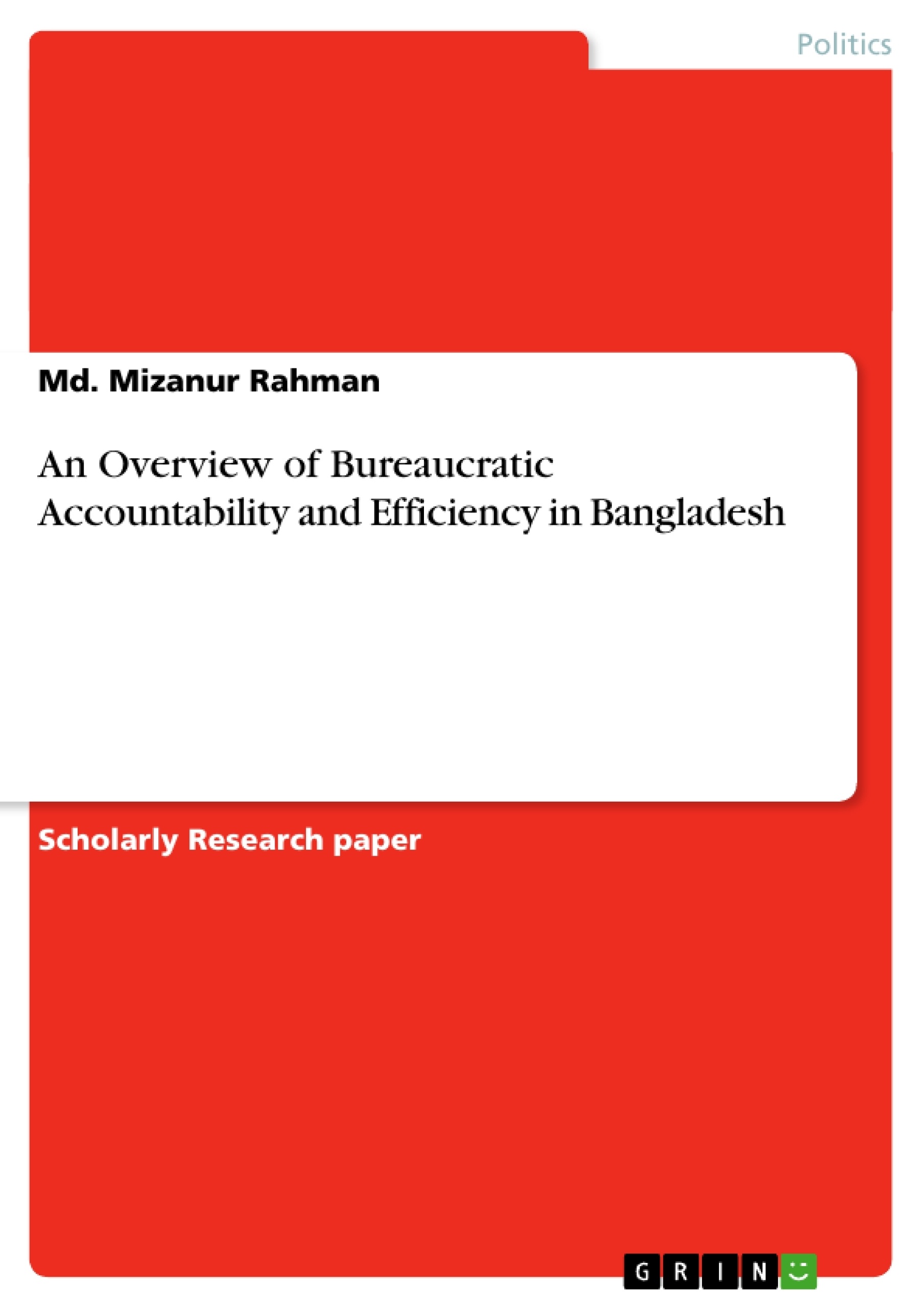In pluralistic societies, all over the world bureaucracy plays a predominant role for bringing social
change, transformation, modernization and development. But in Bangladesh bureaucracy represents a
dismal picture and suffers from various ills. Standing on the threshold of the 21st century when the
whole world is experiencing cataclysmic change in the sphere of political transformation, economic
globalization, technological innovation, media revolution and rapid growth of the nation states- it is
now quite exigent to rearrange or reorganize the state machinery for coexisting with the changed
world order. In consonance with the changes- the role, function and responsibility of bureaucracy
should be devised in a way that it can ensure its productivity and efficiency by creating an enabling
condition for development. Absence of efficiency, transparency, accountability, representational
political culture, institutional weakness of political, social and economical apparatus and malfunction
among those systems has made the bureaucratic system in Bangladesh despicable and disdainful. The
paper, ipso facto, aims at unravelling the issues related with the concept of bureaucracy, the role of
bureaucracy in the third world with special emphasis on Bangladesh, depicting a brief sketch about
the traditional and development bureaucracy in Bangladesh. Lastly, but not the least, some
suggestions to make the bureaucracy accountable, efficient and responsive to the people's demands
and aspirations have been given.
Inhaltsverzeichnis (Table of Contents)
- Abstract
- Introduction
- Bureaucracy: The Conceptual Framework
- A Peep into Bangladesh Bureaucracy: The Legacy of the Past, Struggling with Present Challenges
Zielsetzung und Themenschwerpunkte (Objectives and Key Themes)
This paper aims to provide a comprehensive overview of the bureaucratic system in Bangladesh, highlighting the challenges it faces in terms of accountability, efficiency, and responsiveness to the people's needs. The paper delves into the conceptual framework of bureaucracy, its historical development in Bangladesh, and the present challenges it confronts.
- Bureaucratic Accountability and Efficiency in Bangladesh
- The Role of Bureaucracy in Developing Countries
- The Legacy of Colonial Bureaucracy in Bangladesh
- Challenges to Bureaucratic Reform in Bangladesh
- Measures for Enhancing Bureaucratic Accountability and Efficiency
Zusammenfassung der Kapitel (Chapter Summaries)
- Abstract: This section provides a concise overview of the paper's key arguments and themes. It highlights the challenges of bureaucratic accountability and efficiency in Bangladesh, particularly within the context of a developing nation navigating a rapidly changing world. The paper emphasizes the need for reform to ensure the bureaucracy's effectiveness in promoting socio-economic development and serving the needs of the people.
- Introduction: The paper begins by outlining the dominant role of bureaucracy in Bangladesh's public life. It explores the structure of the country's government, emphasizing the executive branch's responsibility for development, and highlights the inefficiencies within the bureaucratic system that impede effective policy implementation and service delivery.
- Bureaucracy: The Conceptual Framework: This section delves into Max Weber's theory of bureaucracy, exploring the principles and mechanisms of a rational and efficient model of organization. It examines the historical development of bureaucracy as a response to the challenges of industrialization and the need for order and efficiency. It also highlights the potential drawbacks of bureaucracy, such as rigidity, inflexibility, and over-centralization.
- A Peep into Bangladesh Bureaucracy: The Legacy of the Past, Struggling with Present Challenges: This section examines the evolution of bureaucracy in Bangladesh, tracing its roots back to British colonial rule and the subsequent Pakistani administration. It highlights the continued influence of the colonial system on the present bureaucratic structure and practices, and analyzes the challenges to reform stemming from factors such as political patronage, factionalism, and a lack of accountability.
Schlüsselwörter (Keywords)
This paper centers around the key themes of bureaucratic accountability, efficiency, and reform in Bangladesh. Key concepts include the Weberian model of bureaucracy, the legacy of colonial administration, political patronage, factionalism, corruption, inefficiency, and the need for institutional and structural changes to ensure effective governance and development.
Frequently Asked Questions
What are the main problems facing the bureaucracy in Bangladesh?
The bureaucracy suffers from a lack of efficiency, transparency, and accountability, as well as issues with political patronage, corruption, and institutional weakness.
How did colonial rule influence the current system?
The current bureaucratic structure in Bangladesh still carries the legacy of British and Pakistani colonial administrations, which were designed more for control than for development.
What is Max Weber's theory of bureaucracy?
Weber's model describes a rational-legal system based on hierarchy, clear rules, and meritocracy, intended to maximize efficiency and order in large organizations.
How does political patronage affect bureaucratic efficiency?
Political patronage often leads to appointments and promotions based on loyalty rather than merit, which undermines professional standards and service delivery.
What measures are suggested for reform?
The paper suggests structural changes to enhance accountability, decentralization, and the creation of a more responsive and people-oriented administrative culture.
- Quote paper
- Md. Mizanur Rahman (Author), 2013, An Overview of Bureaucratic Accountability and Efficiency in Bangladesh, Munich, GRIN Verlag, https://www.grin.com/document/209733



